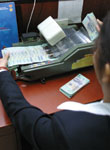Rising dong may hit exports
The Vietnamese dong remained steady during 2006, but a recent sharp rise in the dollar supply could lead to an appreciation of the dong and negatively affect national export competitiveness.
 A narrowing trade deficit, and record-high FDI and remitttances have made the dong slightly stronger |
The dong fell against the US dollar by 1 per cent in the first 11 months of 2006, confirming a 10-year pattern of the dong declining annually against the dollar, according to a General Statistics Office report.
However, after reaching VND16,100 per dollar for the first time ever on December 15, the dong has been gradually appreciating by the narrowing trade deficit, record-high foreign direct investment, and increasing remittances from overseas Vietnamese, all of which have boosted the dollar supply.
Exports in 2006 were estimated at $39.6 billion, 22.1 per cent higher than in 2005, reinforcing expectations for a trade deficit of $3 billion, 30 per cent less than in 2005, according to a Ministry of Trade report. Foreign direct investment in both new projects and increased funds for existing projects was estimated to rise to a record $10.2 billion.
According to Bui Thu Hang, head of VP Bank’s Foreign Exchange Department, US dollar inflows to the bank this year increased 30 per cent following increased remittances from overseas Vietnamese. Estimates of the Committee for Overseas Vietnamese placed dollar inflows from remittances at $5 billion in 2006, 16.5 per cent higher than 2005.
The head of VIBank’s Corporate Credit Department, Tran Kim Chi, said her bank has seen its dollar sales fall lower than purchases in recent days.
“We think that importing businesses will borrow Vietnam dong and then exchange them for US dollars as the supply is profuse,” she said.
Pham Chi Quang, an economist from Vietnam’s Central Institute of Economic Management, said that the revaluation of the dong will urge people who have dollars to sell, which will put more pressure on the Vietnam dong to gain against the US dollar.
According to some domestic banks, foreign currency reserves have fluctuated over the last few weeks at around the limit of 30 per cent of registered capital set by the State Bank of Vietnam. Accordingly, upon closing, banks have had to sell foreign currency surpluses that have arisen during the day, with the State Bank being the ultimate buyer.
“Commercial banks should set a suitable rate to sell out surpluses. The central bank will assist technically if needed to maintain the Vietnam dong’s gradual depreciation again the US dollar,” said the State Bank of Vietnam’s foreign exchange management director, Truong Van Phuoc.
Phuoc said that the dong’s revaluation against the dollar remained under control.
“The central bank will soon work out measures to prevent the Vietnam dong’s further appreciation against the US dollar,” he said.
Earlier this year, the Thai Frozen Foods Association complained that they were losing orders to competitors in Vietnam as the baht gained over 12 per cent against the US dollar while the dong continue to decline, making Vietnamese goods cheaper to overseas buyers.
Last September, the Group of Seven industrialised nations called for emerging economies with current-account surpluses to have more flexible currencies.
No. 794/January 1-7, 2007
What the stars mean:
★ Poor ★ ★ Promising ★★★ Good ★★★★ Very good ★★★★★ Exceptional
Latest News
More News
- Cashless payments hit 28 times GDP in 2025 (February 04, 2026 | 18:09)
- SSIAM and DBJ launch Japan Vietnam Capital Fund (February 04, 2026 | 15:57)
- Banks target stronger profits, credit growth in 2026 (February 04, 2026 | 15:43)
- Vietnam on path to investment-grade rating (February 03, 2026 | 13:07)
- Consumer finance sector posts sharp profit growth (February 03, 2026 | 13:05)
- Insurance market building the next chapter of protection (February 02, 2026 | 11:16)
- NAB Innovation Centre underscores Vietnam’s appeal for tech investment (January 30, 2026 | 11:16)
- Vietnam strengthens public debt management with World Bank and IMF (January 30, 2026 | 11:00)
- Corporate bond market poised for stronger growth cycle (January 28, 2026 | 17:13)
- Vietnam's IPO market on recovery trajectory (January 28, 2026 | 17:04)
















 Mobile Version
Mobile Version